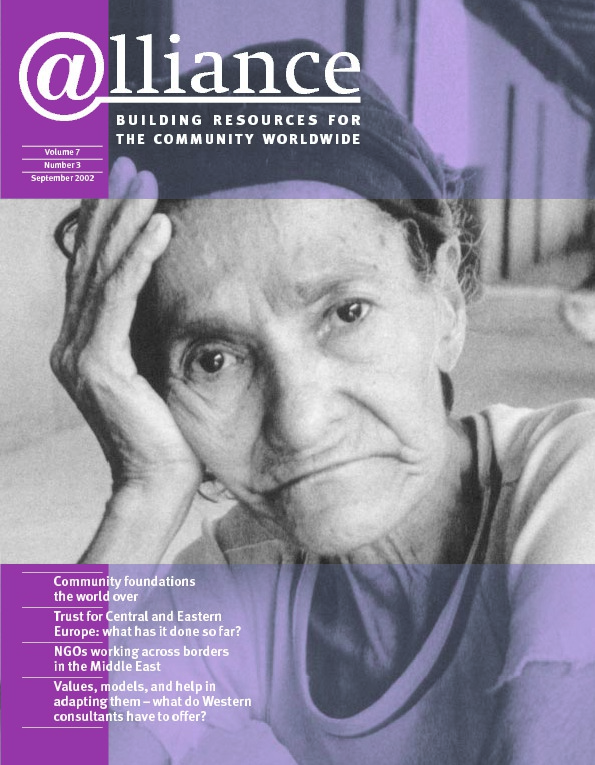Italy is probably the Western European country that has been most affected by the fall of communism in Central and Eastern Europe. Not a single party that was active in the Italian parliament in 1989 is still there today. These changes have influenced the Italian non-profit sector too.
Having had a highly centralized government tradition, Italy is now seeing a strong movement towards devolution. Last year saw a change in the constitution in this direction and now there is a minister for devolution. Today everybody is talking about solidarity and subsidiarity. At the same time there has been a movement away from the all-providing welfare state. We have to rediscover that each community must be responsible for meeting its own needs and stop expecting the state to solve our every problem.
New context for the non-profit sector
The effect of all this is that the non-profit sector is growing rapidly and charged with new responsibilities. Ten years ago there were no grantmaking foundations in Italy and the non-profit sector was not recognized as a significant player in society.
For a long time, Italian NGOs were attached to political parties and were seen by them as an instrument to conquer and control civil society. Each party had its own organizations for leisure, culture and social assistance. Today Italian NGOs are freer from this political pressure, but they are still heavily dependent on funding from the public administration and there is a real risk that they will simply be used by local authorities to provide low-cost social services.
Cariplo’s Community Foundation Project
This is the context in which the Cariplo Foundation decided to introduce the concept of community foundations, both as a way of solving some of its own internal problems[1] and as a way of helping communities in Lombardy, the region around Milan, to overcome some of the challenges they are facing – helping people to become socially responsible and fostering the financial independence of local NGOs.
The path the new community foundations have decided to follow to achieve these goals is to promote the culture of giving. The ultimate goal is not to solve specific community problems – this will simply be the natural result of grantmaking – but to help everybody to rediscover the meaning and pleasure of giving. In a world where everything is a question of power (political or economic), giving helps us overcome this harsh logic, to fully express our humanity, and so to build a real community.
Helping people to give
The boards of the new community foundations are aware that they do not have the authority to decide how best to tackle the challenges facing the community. They can, however, help people give money, time and experience. They can help overcome some of the bureaucratic, fiscal, legal, cultural and practical obstacles that prevent people from giving. The Italian community foundations are too new, and have too limited knowledge of their community, to play the sort of leadership role they play in other countries, but they can act as a bridge between NGOs and donors, helping the former to shape interesting projects and present them to the community and helping the latter to give in a more efficient and sensible way.
This approach, based on humility and respect for other people’s experience and values, is very necessary in communities where there is a real lack of trust for anyone performing a community role. In a society where previously having the right connections was much more important than having a good project if you were applying for a grant, it was crucial to develop approaches that would involve the community in making the final decision, for instance using challenge grants to stimulate gifts for community projects. This means that a foundation will give a grant only if citizens, corporations or others are willing to make gifts to the foundation in favour of that specific project. In Como, for example, in a small town of 900 people there have been 90 gifts for a single project.
This approach, together with the assistance provided by the Cariplo Foundation, probably explains the success of the project: in three years 12 community foundations have been established in Lombardy. They have been able to raise several million euro and they are starting to acquire a deeper knowledge of their community, which they will use to help both NGOs and donors. All this was possible because they knew that the better way to make a better world is not to have the ultimate solution, but to help every single person to give the most of himself or herself.
Facts and figures
- The number of CFs rose from two in 1999 to 10 in 2001.
- Total CF assets rose from 16.5 million euros in 1999 to 64 million euros in 2001.
- Grantmaking rose from 500,000 euros (33 projects) in 1999 to 6 million euros in 2001 (538 projects).
1 See Alliance, Vol 4, No 3, 1999, p10.
Bernardino Casadei is Project Coordinator at the Cariplo Foundation. He can be contacted at bernardino@tin.it
For more information, please contact Bernardino Casadei at bernardino@tin.it or visit the website at http://www.fondazionecariplo.it/Fondazioni_Locali.htm


Comments (0)